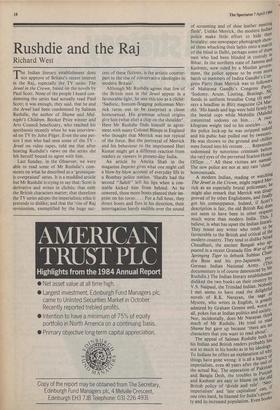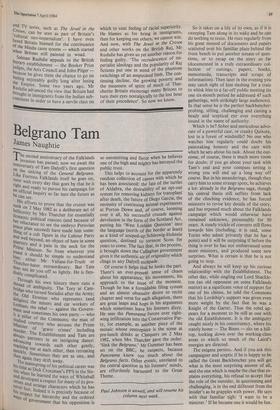Rushdie and the Raj
Richard West
The Indian literary establishment does not approve of Britain's recent interest in the Raj, especially the TV series The Jewel in the Crown, based on the novels by Paul Scott. None of the people I heard con- demning the series had actually read Paul Scott; it was enough, they said, that he and the Jewel had been condemned by Salman Rushdie, the author of Shame and Mid- night's Children, Booker Prize winner and Arts Council beneficiary, who reached his apotheosis recently when he was interview- ed on TV by John Pilger. Even the one per- son I met who had seen some of the TV Jewel on video tapes, told me that after hearing Rushdie's views on the series she felt herself bound to agree with him.
Last Sunday, in the Observer, we were able to read some of Mr Rushdie's com- ments on what he described as a 'grotesque- ly overpraised' series. It is a muddled article but Mr Rushdie is trying to say that: Scott is derivative and writes in cliches; that only the British characters matter; that therefore the TV series adopts the imperialistic ethic it pretends to dislike; and that the 'rise of Raj revisionism, exemplified by the huge suc-
cess of these fictions, is the artistic counter- part to the rise of conservative ideologies in modern Britain'.
Although Mr Rushdie agrees that few of the British men in the Jewel appear in a favourable light, he sees this too as a cliche: 'Sadistic, bottom-flogging policeman Mer- rick turns out to be (surprise) a closet homosexual. His grammar school origins give him (what else) a chip on the shoulder'. Here Mr Rushdie finds himself in agree- ment with many Colonel Blimps in England who thought that Merrick was not typical of the force. But the portrayal of Merrick and his behaviour to the imprisoned Hari Kumar might get a different reaction from readers or viewers in present-day India.
An article by Amrita Shah in the magazine Imprint gives what one might call a blow-by-blow account of everyday life in a Bombay police station. 'Hardly had the second "Sahib" left his lips when a con- stable kicked him from behind. As he cowered, three more boots planted their im- print on his torso.... For a full hour, they thrust boots and fists in his direction, their interrogation barely audible over the sound
The Spectator 7 April 1984 of screaming and of shoe leather meeting flesh'. Unlike Merrick, the modern Indian police make little effort to hide their brutality: one newspaper photograph show- ed them whacking their lathis onto a march of the blind in Delhi, perhaps some of them men who had been blinded in custody in Bihar. In the northern state of Jammu and Kashmir, now ruled by a Muslim govern- ment, the police appear to be even more harsh to members of Indira Gandhi's Con- gress Party than Merrick was to followers of Mahatma Gandhi's Congress Party. 'Sodomy. Arson. Looting. Beatings. fiends in uniform brutalise Cong (I) men says a headline in Blitz magazine (24 Mar- ch). 'His hands and legs were held firmlY bY, the bestial cops while Mohidin (Mohda' committed sodomy on him... A two- kilogram weight tied to his testicles.. • At the police lock-up he was stripped naked and his pubic hair pulled out by tweezers. He was thrown to the ground and chillies were forced into his rectum.... Repeatedly sodomised by notorious criminals before the veil, eyes of the perverted Station'Hous,e Officer ... ' All these victims are named; The new police are not at any rate 'closet homosexuals. A modern Indian, reading or watching The Jewel in the Crown, might regard Mer rick as an especially brutal policeman; he might also remark that Merrick was disap- proved of by other Englishmen, and finally got his comeuppance. Indeed, if Scott s description is fair, the old British Raj does not seem to have been in other respects much worse than modern India. This, 1 believe, is what has upset the Indian literati. They resent any writer who tends to be favourable to the British and critical of the, modern country. They tend to dislike Ni Chaudhuri, the ancient Bengali who ap peared in a recent Granada film War of the Springing Tiger to debunk Subhas Chan- dra Bose and his pro-Japanese, German Indian National Army. (This documentary is of course denounced bY Mr Rushdie.) The Indian literary establishment disliked the two books on their country bY V.S. Naipaul, the Trinidad Indian. Nob°dY, I met seems to have read the delightful novels of R.K. Narayan, the sage (31' Mysore, who writes in English, is greatly admired by Graham Greene and, worst of all, pokes fun at Indian politics and soelerY,1 Nor, incidentally, does Mr Narayan think much of Mr Rushdie. He tried to react Shame but gave up because 'there are, no characters that you want to read about'. The appeal of Salman Rushdie both .to his Indian and British readers probably Iles not so much in his books as in his ideologY. To Indians he offers an explanation of NOY, things have gone wrong: it is all a legacy or, imperialism, even 40 years after the end or the actual Raj. The separation of Pakistan and Bangla Desh, the troubles in Punjab and Kashmir are easy to blame on the old British policy of 'divide and rule'. 'Ne°4 imperialism' and 'late capitalism' can, I.. one tries hard, be blamed for India's pover- ty ty and its increased population. Even books and TV series, such as The Jewel in the Crown, can be seen as part of Britain's cultural neo-imperialism'. I have even heard Britain blamed for the continuance of the Hindu caste system — which started when Britons still painted in woad. Salman Rushdie appeals to the British l.iterary establishment — the Booker Prize Judges the Arts Council and John Pilger because he gives them the chance to go on feeling enjoyably guilty long after losing the Empire. Some two years ago, Mr Rushdie advanced the view that Britain had brought in immigrants from the Indian sub- continent in order to have a servile class on
which to vent feeling of racial superiority. He blames us for bring
in immigrants, then for keeping out others; we cannot win. And now, with The Jewel in the Crown and other works on the British Raj, Mr Rushdie has given us yet another reason for feeling guilty. 'The recrudescence of im-
perialist ideology and the popularity of Raj fictions put one in mind of the phantom twitchings of an amputated limb. The con- tinuing decline, the growing poverty and the meanness of spirit of much of That- cherite Britain encourage many Britons to turn their eyes nostalgically to the lost hour of their precedence'. So now we know.











































 Previous page
Previous page